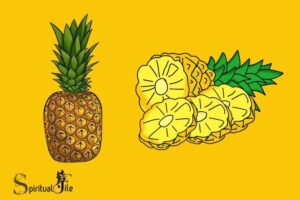What Does Thorns Represent Spiritually? Pain!
Thorns represent spiritually the obstacles, pain, and suffering that one may encounter on their spiritual journey or path to enlightenment.
In various religious and spiritual traditions, thorns are often used as a metaphor for the challenges and hardships that one must overcome in order to grow spiritually and attain a higher level of consciousness.
These obstacles can manifest in various forms, such as personal struggles, external forces, or even internal conflicts.
The presence of thorns in one’s spiritual path serves as a reminder that growth often comes with pain and that overcoming these challenges can lead to spiritual progress and enlightenment.
The symbolism of thorns in different spiritual traditions highlights the universal nature of encountering challenges and obstacles on the path to personal growth and spiritual enlightenment.
In Christianity, the crown of thorns placed on Jesus’ head during his crucifixion serves as a powerful symbol of sacrifice, pain, and the burden of sin.
In Buddhism, thorns can represent the clinging to worldly desires and attachments that prevent us from reaching a state of inner peace and ultimate liberation.
7 Aspects: Spiritual Representations of Thorns
| Thorns Representation | Spiritual Meaning |
|---|---|
| Protection | Thorns can symbolize the need for self-defense or protection from negative influences or energies. |
| Sacrifice | In Christianity, the crown of thorns that Jesus wore during the crucifixion represents suffering and sacrifice for the greater good. |
| Pain and Suffering | Thorns can symbolize the trials, tribulations, and challenges that individuals must overcome in their spiritual journey. |
| Growth and Development | The presence of thorns on a plant or flower can symbolize the necessity of embracing pain and difficulty in order to achieve personal and spiritual growth. |
| Hidden Beauty | Thorns can represent the idea that beauty and value can be found in unexpected places, even among sharp and painful obstacles. |
| Spiritual Awakening | Thorns may signify a necessary phase of discomfort or struggle that precedes spiritual enlightenment or awakening. |
| Purity and Humility | In Christianity, the thorns that pierce the Virgin Mary’s heart in the Immaculate Heart of Mary symbolize her purity and humility amidst suffering. |
Key Takeaway

Five Facts About: Spiritual Representations of Thorns
Understanding The Symbolism Of Thorns In Religion
Thorns have been used symbolically in various religious, cultural, and mythological contexts for centuries.
In religion, thorns are more often than not, associated with suffering, sacrifice, pain, and obstacles.
Explore The Different Religious And Cultural Contexts In Which Thorns Are Used As Symbols
Thorns have been used symbolically across various cultures and religions for centuries.
Some of the popular religious and cultural contexts in which thorns are used as symbols include:
- Christianity: Thorns are prominently associated with the crucifixion of jesus christ and are used to symbolize the pain and suffering he endured while on the cross.
- Greek mythology: The greek god, bacchus, is often depicted with a “thorned crown” to symbolize his immortality.
- Hinduism: The goddess kali is often depicted wearing a garland of skulls, with thorns at the base, to symbolize the destruction of ignorance and ego.
- African culture: In some african cultures, thorns are used in spiritual and religious rituals to “cleanse” and “purify” individuals.
Discuss The Common Themes And Meanings Associated With Thorns In Religion
Thorns are often associated with negative emotions, such as pain, suffering, and obstacles.
Here are some common themes and meanings associated with thorns in religion:
- Suffering: Thorns are often used to symbolize suffering, such as the crown of thorns worn by jesus christ during his crucifixion.
- Sacrifice: Thorns are also used to symbolize sacrifice, as seen in the “thorned crown” of bacchus, which signifies his immortal sacrifice.
- Obstacles: Thorns represent obstacles that a person may have to overcome in their spiritual journey.
- Protection: In some instances, thorns are used to symbolize protection, as in the “thorny garland” worn by the hindu goddess kali, which is said to protect her devotees from negative energy.
Highlight How Thorns Are Typically Portrayed In Religious Texts And Artwork
In religious texts and artwork, thorns are often used to symbolize pain, suffering, and obstacles.
Here are a few examples:
- The bible: In the bible, thorns are mentioned as a punishment in the garden of eden and also in the new testament during the crucifixion of jesus christ.
- Greek mythology: In greek mythology, the crown of thorns is worn by bacchus, the god of wine, and is symbolic of his immortal sacrifice.
- Hinduism: In hinduism, thorns are often associated with goddess kali and are seen as a symbolic representation of her power.
Thorns have significant symbolic meanings in various religious and cultural contexts. They represent suffering, sacrifice, obstacles, and at times, protection.
These symbolic meanings have been portrayed in the artwork and religious texts of various cultures and religions.
The Spiritual Significance Of Thorns In Nature
Thorns are a common feature of the natural world – from the prickly pear to the rose bush.
While some might associate these prickly protrusions with pain and discomfort, there’s actually much more to thorns than meets the eye.
In fact, thorns have a deeply spiritual significance that connects us to the wider natural world.
Here, we’ll take a closer look at the spiritual significance of thorns and what they represent.
Explain The Role Of Thorns In Nature And Their Adaptation To Their Environment
Thorns have adapted to the natural world in numerous ways. The most obvious is their role as a defense mechanism against predators.
Animals that might otherwise nibble on a plant’s leaves or stems are thwarted by its prickly thorns. But there’s more to it than just protection.
Thorns also help plants conserve water – those small, waxy leaves take up less water than a full, broad leaf. In turn, this allows the plant to survive in harsh, arid climates.
Discuss How Thorns Are Used For Protection Against Predators
Thorns protect plants by discouraging predators from eating them. These prickly protuberances are painful to touch and can cause irritation or injury to an animal’s mouth or skin.
They’re an effective deterrent against grazing animals, who are more likely to move on to a different plant than risk getting hurt.
But it’s not just four-legged predators – thorns can also deter insects and parasites from infesting and damaging a plant.
Highlight How The Physical Characteristics Of Thorns Align With Their Spiritual Symbolism
The physical characteristics of thorns align closely with their spiritual symbolism. Sharp, pointed, and often cruel-looking, thorns are a potent symbol of pain and suffering.
In religious iconography, thorns are often associated with martyrdom, sacrifice, and the weight of sin.
Yet despite their painful exterior, thorn-bearing plants are often beautiful, delicate, and graceful – a reminder that even in times of pain and sorrow, there is still hope, beauty, and resilience to be found.
Thorns represent much more than just an unpleasant brush with nature.
They’re an essential component of many plant species’ survival strategies, and they carry a deep spiritual significance that connects us to the wider natural world.
By understanding the role of thorns in nature and their symbolism, we can gain a greater appreciation for the complexity and beauty of the natural world.
Thorns And The Struggle For Growth
As we navigate through life, we encounter a multitude of obstacles. Some of them are visible and easy to overcome, while others are more abstract.
Thorns are an apt metaphor for the latter. They represent the challenges that are necessary for us to grow and develop.
Explore The Metaphorical Meaning Of Thorns As Barriers To Growth And Development
Thorns are prickly, painful and can cause harm if not handled with care. In the same way, the barriers that we face in life can be just as painful and daunting.
However, when faced with thorns, we must rise to the challenge and find ways to overcome them.
Thorns represent the uncomfortable and often painful aspects of life that one must navigate in order to grow both spiritually and mentally.
Discuss How Thorns Can Represent The Challenges And Obstacles One Faces In Life
Just as thorns represent the challenges that one must navigate in life, so do they represent the obstacles that we must push through. Each setback brings with it new thorns that must be navigated.
As with thorns, these obstacles can feel painful and uncomfortable.
However, we must push through them, embracing each as a learning opportunity.
Some key obstacles that we face in life include:
- Fear of the unknown
- Lack of confidence
- Negative outlook
- Resistance to change
- Lack of clarity
Explain How Thorns Can Also Represent The Strength And Resilience Necessary To Overcome Those Challenges
Despite their prickliness and pain, thorns are a testament to nature’s strength and resilience. They are a reminder that even amid adversity, life can somehow thrive and grow.
The same is true for the obstacles we face in life. Each challenge we overcome imbues us with strength and resilience. Thorns represent the trials we must endure, but also the fortitude we gain in overcoming them.
When we see thorns, we must remember that they represent barriers to growth and development and that we must navigate them with strength and resilience.
By pushing through each obstacle, we come out stronger, more capable and better equipped to overcome the next set of thorns that lie ahead.
The Power Of Turning Thorns Into Roses
Challenges, struggles, and hardships are inevitable parts of life, and they can manifest themselves in various forms.
One of the most common symbols for these obstacles is thorns. While thorns can represent pain and difficulty, they can also represent the potential for transformation and growth.
In this section, we will discuss the transformative power of embracing challenges and struggles in life.
- Embracing challenges allows you to develop resilience and strength. By facing and overcoming adversity, you can build a sense of self-confidence and empowerment.
- Struggles can also lead to personal growth and learning opportunities. Many times, when we face difficult situations, we are forced to develop new skills or perspectives to navigate them.
- Transforming thorns into roses requires a shift in mindset. Viewing difficulties as opportunities for growth rather than as obstacles can give us a fresh perspective and the motivation to overcome them.
Explore The Idea Of Turning Adversity Into A Source Of Inspiration And Growth
It’s easy to become stuck in a negative mindset when facing challenges.
However, when we shift our thinking and see obstacles as opportunities, we can transform adversity into a source of inspiration and growth.
- Adversity can be a catalyst for creativity. Many individuals have used difficult situations to fuel their art, writing, or other endeavors.
- Problems can also be stepping stones towards success. In many cases, challenging situations have allowed individuals to identify their strengths, passions, or a new path in life.
- Reframing challenges as opportunities helps us to develop a growth mindset. Instead of feeling defeated by hardship, we can see it as a chance to develop new skills and to learn more about ourselves.
Highlight Real-Life Examples Of Individuals Who Have Turned Their “Thorns” Into “Roses”
Many people have found ways to turn their struggles into positives, and their stories serve as inspiration to others facing challenges.
Here are a few examples:
- Oprah winfrey: Born into poverty and abuse, oprah winfrey overcame these obstacles to become one of the most successful media personalities of our time. She has since used her platform to promote positive messages and to help others facing similar challenges.
- J.k. rowling: After experiencing numerous rejections, j.k. rowling finally found a publisher for her harry potter series. The books became a worldwide sensation, making rowling one of the wealthiest authors in the world.
- Nick vujicic: Born without limbs, nick vujicic has become a motivational speaker, spreading his message of hope and positivity to millions of people worldwide.
In each of these cases, these individuals have taken what could have been perceived as a thorn and have transformed it into a rose, demonstrating that struggles can be a source of inspiration and growth.
Thorns represent challenges and struggles in life, which are inevitable for everyone.
This section has highlighted the transformative power of embracing these difficulties, exploring the idea of turning adversity into a source of inspiration and growth, and providing real-life examples of individuals who have turned their thorns into roses.
By embracing our challenges and reframing them as opportunities, we can transform our lives and become stronger, more resilient individuals.
How Can Thorns Symbolize Pain and Spices Symbolize Healing in a Spiritual Context?
In a spiritual context, thorns symbolize pain and spices symbolize healing. Thorns represent the hardships and challenges we face in life, while spices symbolize spiritual healing and the restoration of our mind, body, and soul. Through the use of spices and spiritual healing practices, one can find relief and inner peace.
FAQ About On What Does Thorns Represent Spiritually ?
What Is The Spiritual Significance Of Thorns?
Thorns have a spiritual meaning that is often related to pain, sin, and curse. They symbolize the hardships and obstacles we encounter in life.
What Does The Bible Say About Thorns?
In the bible, thorns are mentioned in various contexts, representing sin, suffering, and death. They also signify the curse that was placed on the earth after adam and eve’s fall.
How Do Thorns Relate To Jesus’ Crown Of Thorns?
Jesus’ crown of thorns symbolizes his suffering and sacrifice. It was placed on his head to mock him and cause him pain. In christian teachings, it represents the ultimate sacrifice made by jesus for our sins.
What Does It Mean If You Dream About Thorns?
Dreams about thorns can represent feelings of hurt, betrayal, or obstacles in your path. They may also symbolize the need for protection and caution in your waking life.
What Spiritual Lessons Can We Learn From Thorns?
Thorns teach us that pain and suffering are a part of life, but there is always hope and redemption. They also remind us to be cautious and vigilant in our actions and to protect ourselves from harm.
Conclusion
Thorns represent a powerful and versatile spiritual symbol that has been used across various cultures and religious traditions for centuries.
From trials and suffering to protection and transformation, thorns have deeper meanings that can help us understand our journey in life.
Whether in biblical references or other spiritual contexts, the prickly symbols of thorns remind us of the complexity and beauty of our experiences.
They can be a source of comfort, guiding us towards growth and transformation or a warning sign, signifying a potential threat or danger.
Therefore, acknowledging the spiritual significance of thorns can provide us with an opportunity for deeper reflection, enabling us to begin connecting with our inner selves and the world around us in a meaningful way.
So, let us embrace and appreciate the messages that thorns bring, allowing us to grow beautifully and bloom where we are planted.






